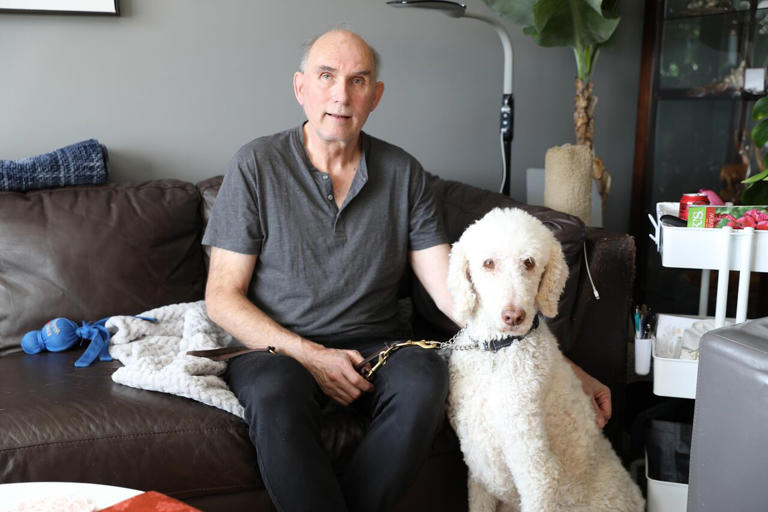CANADA NEWS – Georgina Villeneuve’s harrowing experience on a Porter Airlines flight last month serves as a stark reminder of the ongoing struggles faced by individuals with disabilities. Villeneuve, who is deaf and relies on her service dog, Maggie, found herself in a humiliating situation that highlighted significant gaps in the airline’s understanding and compliance with service animal regulations.
Villeneuve, a resident of Edmonton, lost most of her hearing a few years ago due to a viral infection, leaving her with just 15% hearing in her left ear and unable to hear from her right. She communicates primarily by reading lips and depends on Maggie to alert her to sounds and dangers in her environment. This crucial support system was put to the test when a flight attendant ordered her to place Maggie under the seat in front of her during taxiing, a demand that directly violated both Porter Airlines’ own policies and Canadian transportation regulations regarding service animals.
The incident escalated quickly as Villeneuve, already dealing with the anxiety of flying, faced not only the unreasonable demands of the flight attendant but also verbal abuse from a fellow passenger. “He kept yelling and screaming, telling us we were inconsiderate,” Villeneuve recalled, highlighting the distressing atmosphere surrounding her. The situation reached a boiling point when the flight attendant threatened to return the plane to the gate if Villeneuve did not comply with her directive.
Despite providing evidence of Porter’s own regulations that support her right to keep her service dog at her feet, the flight attendant remained adamant. This incident raises serious concerns about the level of training and awareness among airline staff regarding the rights of passengers with disabilities. Robin East, co-chair of the Transportation Committee for the Council of Canadians with Disabilities, expressed disappointment over the incident, noting that service dogs are vital to their owners, not mere accessories.
After the pilot ultimately decided to remove Villeneuve from the flight, she faced an even more embarrassing ordeal as she was escorted off the plane, surrounded by crew members. “It’s so embarrassing,” she said, reflecting on how other passengers likely speculated about her removal. “Did they think, ‘Is she drunk or did she light up a cigarette?’”
Under Canadian law, airlines are required to provide adequate space for service dogs and ensure the comfort and safety of both the passenger and the animal. Specifically, regulations state that the service dog must be able to lie on the floor at the passenger’s feet without obstruction. In cases where the service dog is larger, airlines must accommodate by providing an adjacent seat.
Upon returning to the gate, Villeneuve was met with conflicting messages from airline management. A manager acknowledged that the crew had violated the airline’s own rules, yet offered her the option to reboard the same flight or take a later one. Feeling unsafe due to the aggressive passenger and distrusting of the airline’s handling of the situation, Villeneuve declined and instead booked a last-minute flight with another airline, incurring a hefty cost of $2,960.
Initially, Porter Airlines issued an apology but was reluctant to provide a full refund or reimburse Villeneuve for her additional expenses, only offering a travel voucher, which she also rejected. This was not Villeneuve’s first troubling encounter with Porter; a similar issue had arisen in June when an attendant questioned the legitimacy of Maggie’s service status, despite Villeneuve providing proof on the spot.
Advocates for disability rights, like East, argue that airlines need stricter consequences for failing to adhere to service animal regulations. East himself has had a long history of battling airline policies; in 2009, he successfully lobbied for changes to the “One Person, One Fare” rule, ensuring that airlines provide space for service animals at no extra charge. He contends that the current penalties for violations, which amount to approximately $874,500 in fines over five years, are insufficient compared to the operating revenues of major airlines, which total around $93 billion during the same period.
The experience of Villeneuve is emblematic of the broader issues faced by individuals with disabilities in the air travel system. It calls into question not only the training provided to airline staff regarding service animal policies but also the necessity for airlines to treat disabled passengers with the dignity and respect they deserve.
Porter Airlines has stated that it will expand its training for staff concerning service animals, a step that is welcomed by advocates but one that comes too late for Villeneuve. She has highlighted the emotional toll the incident took on her, revealing that she cried for a week after the experience. “I don’t like to create scenes,” she admitted, emphasizing her desire for a peaceful travel experience that respects her rights as a passenger with a disability.
Villeneuve’s story has sparked conversations across Canada regarding the treatment of disabled individuals in public spaces, particularly in air travel. As airlines like Porter Airlines face scrutiny over their policies and staff training, advocates are calling for systemic changes to ensure that the rights of disabled passengers are upheld and respected.
Ultimately, the case of Georgina Villeneuve underscores a critical need for ongoing education and training within the airline industry. As travel resumes to pre-pandemic levels, it is essential that airlines not only comply with existing regulations but also prioritize the rights and needs of passengers with disabilities. The focus must shift from punitive measures to proactive approaches that foster inclusivity and understanding, ensuring that no passenger has to endure the humiliation and distress that Villeneuve faced.
With the support of advocates and the increasing awareness of the rights of disabled travelers, there is hope for a future where all passengers can travel with dignity and respect, free from discrimination and misunderstanding.
